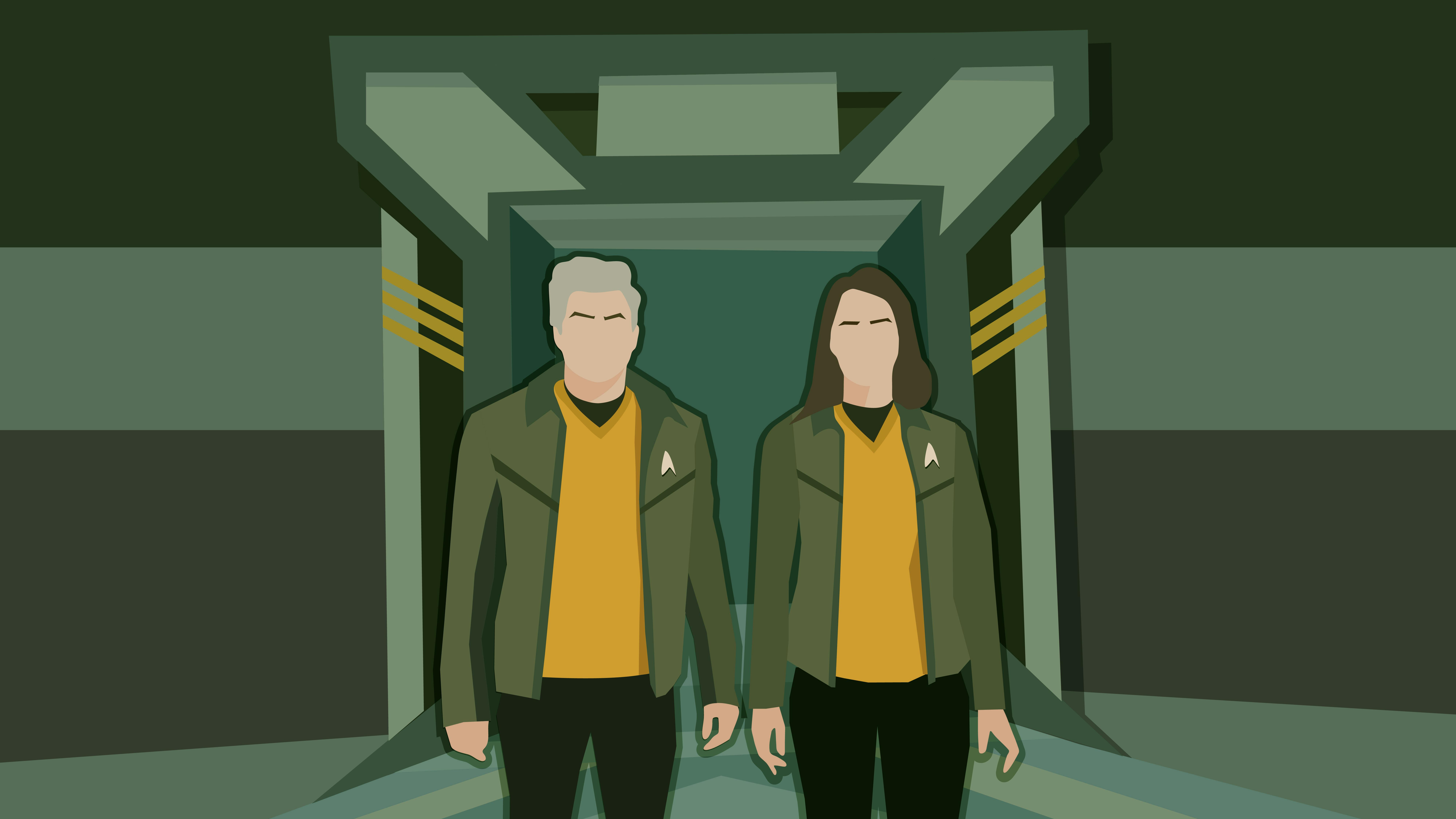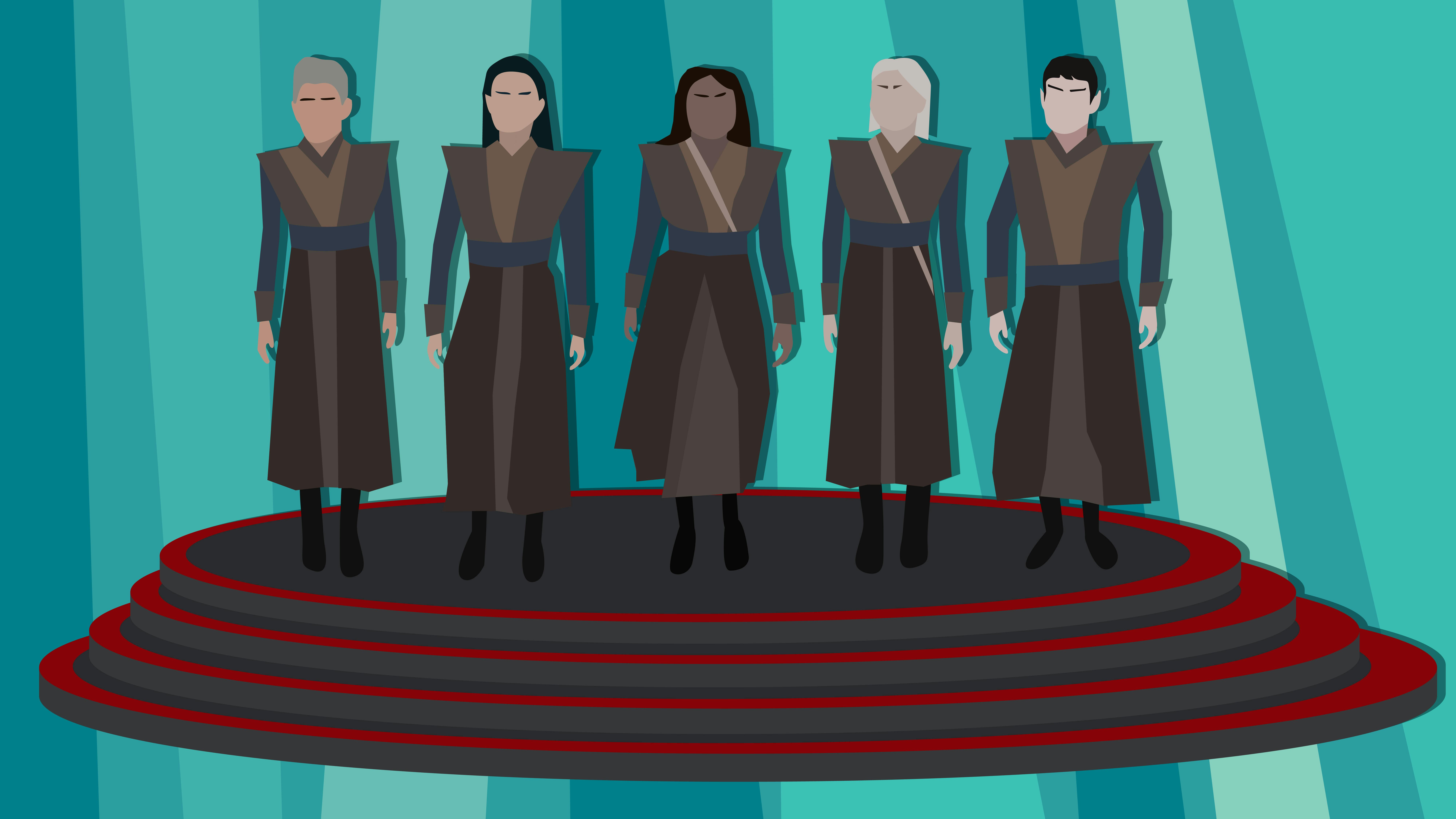Published Mar 31, 2025
Julian Bashir Helped Me Make Trek My Own
For some fans, Bashir serves as a metaphor for the trans experience.
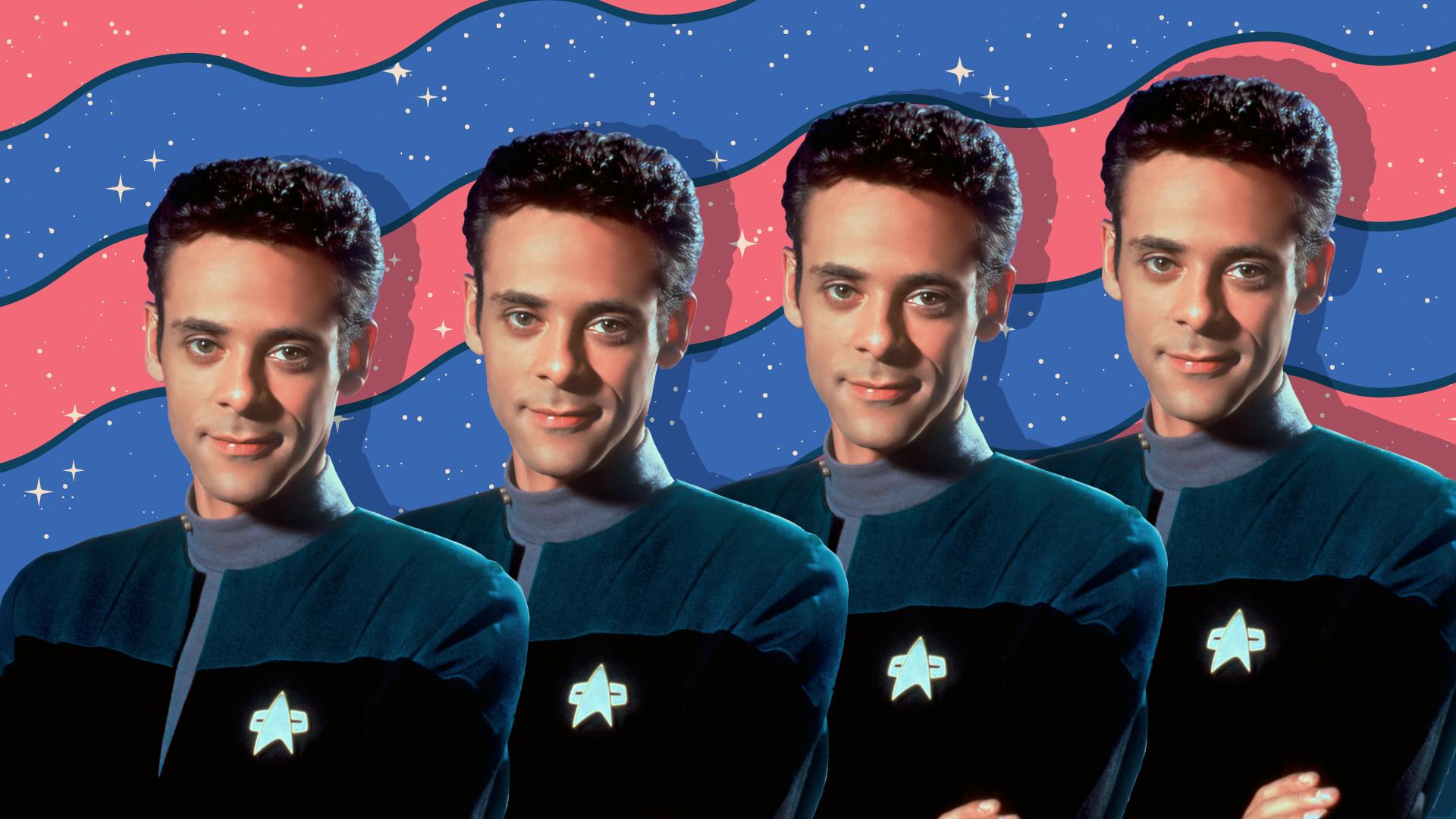
StarTrek.com
You can't discuss LGBTQ+ representation in Star Trek without mentioning Elim Garak and Dr. Julian Bashir of . I knew that much going into my first viewing of the series last year, having finally reached the end of my rope when it came to not understanding the lengthy discussions on the show between my friends on social media.
While one of my friends rightly predicted Bashir and Garak's relationship would immediately grab me, I couldn't anticipate how important Bashir by himself would become. He was already an early favorite, but as the series unfolded, I recognized my experiences and anxieties as a transmasculine person in how Bashir navigated his genetic enhancement. The specific language and stigmas surrounding Augments in Star Trek's society were so familiar that once I began connecting the dots, I couldn't easily see Bashir as anything other than a transgender man.
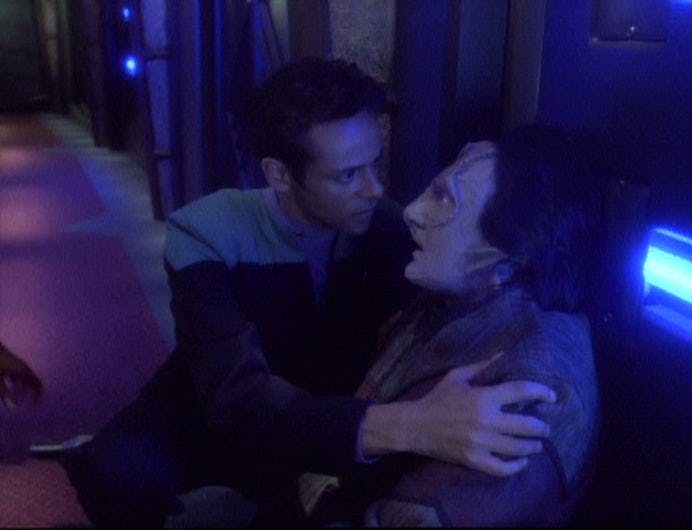
"The Search, Part II"
StarTrek.com
The metaphor connecting genetic enhancement and Augments to the transgender experience is admittedly messy, given the former's central role in wars which killed over half a billion people, and the dark history of eugenics in our real world. Additionally, 300 years removed from these conflicts, Jack, Lauren, Patrick, and Sarina — the four institutionalized Augments first introduced to Bashir in Season 6 — would themselves benefit from a lens of disability more than queerness. It is in the greater context of Bashir's character arc where the multiple angles are clearer; what is specifically involved in genetic enhancement and the ethical implications surrounding it, while not unimportant, are less the focus here than how it functions for Bashir himself and within the narrative as a whole.
When Bashir's status as an Augment is first revealed in "," the concern is not war, but rather how Khan's legacy has translated into a severe societal stigma. At the beginning of the episode (and, retroactively, in previous seasons), he is effectively closeted to Starfleet and the station as a whole; he is allowed to exist unencumbered as he does because he can pass as normal.
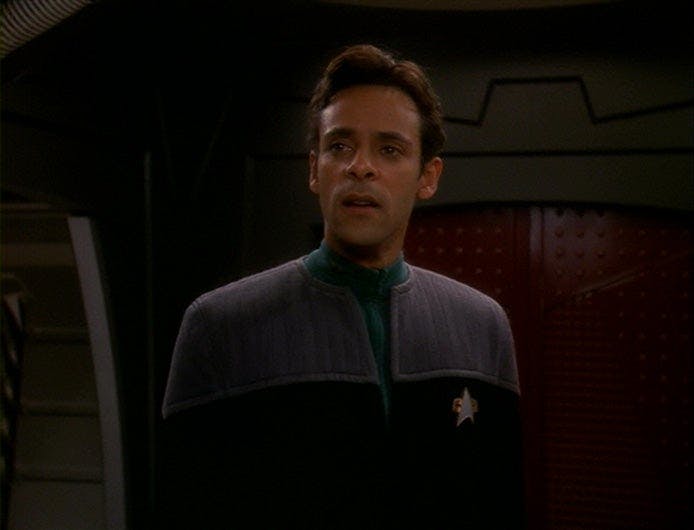
"Doctor Bashir, I Presume"
StarTrek.com
The closet, as it relates to sexuality and gender identity, is a familiar space for queer people, and passing is a prevalent concept among trans people — a trans man is said to "pass" when strangers assume he is a cisgender man. While Bashir's closeting is more generally queer-coded, genetic enhancement has more parallels with a post-transition transgender experience. Both change one's physical body as a means to a specific end, and it is those changes which he is hiding. The DNA of Augments has been resequenced in order to grant higher levels brain function, stamina, and coordination; trans people who opt to transition physically use hormones and surgery to effect changes aligning with their gender.
This means that both an Augment and trans people's bodies are non-normative and evoke accusations of fraud or being unnatural, as Bashir calls himself in a conversation with O'Brien. The intellect that allowed him to rise in prominence as a doctor was not present at his birth; therefore, he is a fraud. The gender of a trans man was not the one assigned at his birth, therefore he is not a real man. The internalized weight of those stigmas speak the same refrains.
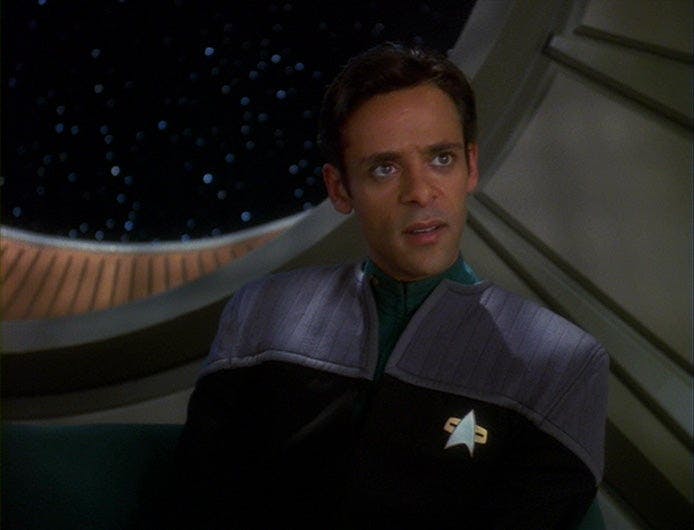
"Doctor Bashir, I Presume"
StarTrek.com
The consequences of Bashir being outed as an Augment further parallel common trans experiences. Having this known about him could upend and completely ruin the life he built for himself — stripped of his position in Starfleet and his medical license, he would lose his livelihood, potentially his residence on Deep Space 9, and the support network of his colleagues.
For trans people, that risk is all too familiar. In the United States, less than half of states count gender identity as a protected class, so coming out publicly carries a real risk of job loss and eviction alongside being ostracized by loved ones, even with June's Supreme Court ruling on LGBTQ+ civil rights. The forces keeping Bashir and trans people in the closet foster a sharp disconnect between the life one is living and the truth of who one is.
That disconnect, of not being able to share such an integral part of oneself for fear of reprisal, can also create a deep sense of loneliness. "," the episode that first introduces the group of Augments from the institution, opens on a scene that underscores the loneliness in Bashir's life. He tries to find a friend to spend time with at Quark's or the holosuites, and they are all busy with partners and families, neither of which Bashir has.

"Statistical Probabilities"
StarTrek.com
His first meeting with Jack, Lauren, Patrick, and Sarina takes place soon afterward, and it doesn't take long for them to accept that Bashir is one of their own — and Bashir thrives off it and their burgeoning camaraderie. In his "coming out" conversation with O'Brien in Season 5, Bashir disparaged himself as a "freak" or "monster" because of his genetic enhancements; but when he presents the Augments' wartime intelligence analysis to Sisko, his enthusiasm is barely contained as he eagerly includes himself among their ranks, making liberal use of "we" and "people like us." For the first time, he is able to find joy in a part of himself because he has found community, a circumstance not foreign to the queer experience.
Community and pride in one's difference still doesn't negate the isolation arising from it. The dinner Bashir shares with the station crew in "Statistical Probabilities" is a textbook example of microaggressions. O'Brien even trots out a classic "what about the childre"” argument about parents feeling pressured to genetically enhance their children if Augments were allowed to participate in society, shifting his earlier personal anxiety ("Makes us all look bad!") into a more acceptable concern for the vulnerable. This tactic is widely used in transphobic discourse as well; it's never that someone hates trans people, they just don't want a trans woman using the same restroom as their young daughter, or they're concerned that overeager parents will pressure their children to transition. It's never explicitly about their own prejudices — it's more difficult to argue against a point framed as benefiting the welfare of children.
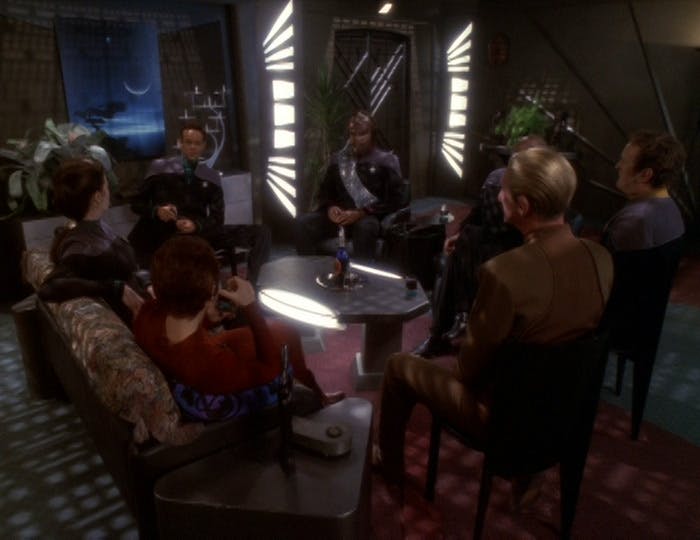
"Statistical Probabilities"
StarTrek.com
Interestingly, most of the discussion the crew has doesn't touch on Khan or WWIII, rather focusing on how societal norms would be disrupted without the laws that keep those like Jack and Lauren institutionalized. They're as concerned about maintaining their order of the world as transphobes are about the inflexibility of binary gender. The insistence that neither of these groups can cohesively integrate into larger society creates a self-fulfilling prophecy.
When the Augments impersonate Starfleet personnel in Season 7 in order to board the station, Sisko is livid about their "flagrant disregard for the rules society lives by" — rules which, Bashir reminds him, belong to a society they are not allowed to live in. Already institutionalized, an Augment like Jack might not see any reason to care about the consequences of impersonating an officer.
Similarly, a 2015 study found nearly 70% of trans sex workers entered the trade after transphobia pushed them out of legal means of employment. Trans people and Augments are punished for daring to exist at all, then punished further for continuing to do so with as little respect for mores as society paid them in the first place. Yet all this does not readily apply to Bashir. After all, as Worf insists at dinner, Bashir is the exception. Bashir is allowed to live a "normal life" among his peers. Bashir can pass.
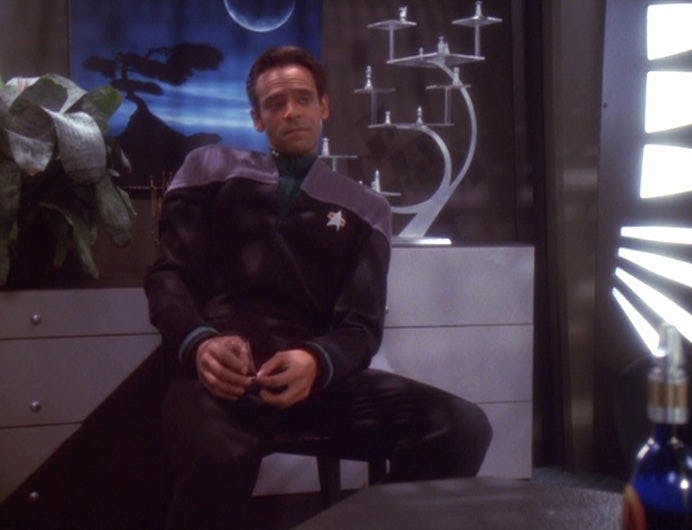
"Statistical Probabilities"
StarTrek.com
Even before the genetic enhancement plot debuted, Bashir's trans loneliness could be said to have manifested in other ways, specifically in how relentlessly he pursued Dax in earlier seasons. Already upheld by fans as a landmark of queer representation for the same-sex kiss in Season 4's "," Dax also canonically exists as a genderfluid character due to the nature of the Trill.
In Deep Space Nine's premiere, Dax's host shifts from Curzon to Jadzia, a transition of physical bodies and also of gender. This colors her interactions with those who knew Curzon before; Sisko affectionately calls Jadzia "old man," and Curzon's Klingon friends call upon her to . Jadzia and Curzon are treated simultaneously as the same yet different people, tracing the through-line connecting them while recognizing their discrete identities, just as one might with a trans person who has transitioned.
In the earlier seasons, with his need to stay closeted and the repressed self-loathing later revealed to O'Brien, Bashir is undoubtedly under intense internal strain. It's then when he meets Jadzia, who outwardly displays all the confidence in the quadrant. On the surface, his dogged flirting comes across as a generic expression of heterosexual desire, but reading Bashir as a trans man through his Augment status complicates this. While of course he could be drawn based on physical attraction, he could also be searching for connection based on shared experience, or even a search for guidance. Jadzia, being the eighth Dax host, has gone through significant changes of self many times already, transitioning genders in half of them.
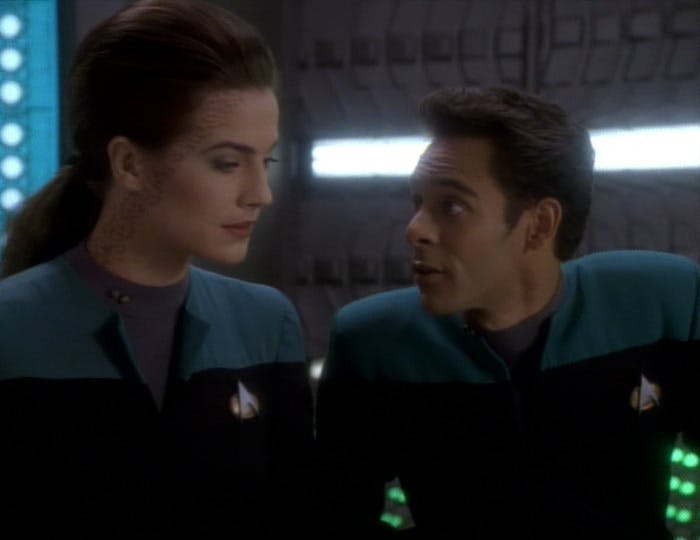
"A Man Alone"
StarTrek.com
Bashir's pre and post-transition senses of self lie in the child he was versus the man he is now. He even arguably has what the trans community calls a deadname, a birth name that is no longer used in favor of a chosen name that better reflects someone's gender. In an argument with his parents in Season 5, Bashir reveals he stopped going by the nickname his parents used, Jules, as a teenager after he learned he was an Augment. When his parents finally address him as Julian, it's framed as a healing moment where they finally see Bashir for who he says he is instead of who they wished he would be. The reconciliation of different identities that Dax is adept in solving comes much later and with much more difficulty for Bashir, and he perceives her self-assurance as a beacon.
While he never does enter into a romantic relationship with Jadzia, these connections crop up again in two other relationships of his down the line. In Season 7's "," Bashir's short-lived whirlwind romance with fellow Augment Sarina is based entirely in the joy of being seen for who he is without having to explain himself. He tells O'Brien that it's something he has long fantasized about, being with someone like himself and living a normal life, and he is devastated when he moves too fast and they are forced to break it off. There is a sense of inopportune timing in both relationships regarding where each of them is in their lives — the "trans elder" Jadzia is not at all the right match for a closeted Bashir, nor is a Bashir that has been out for a few years a good fit for Sarina, who is just learning how to live outside an institution.
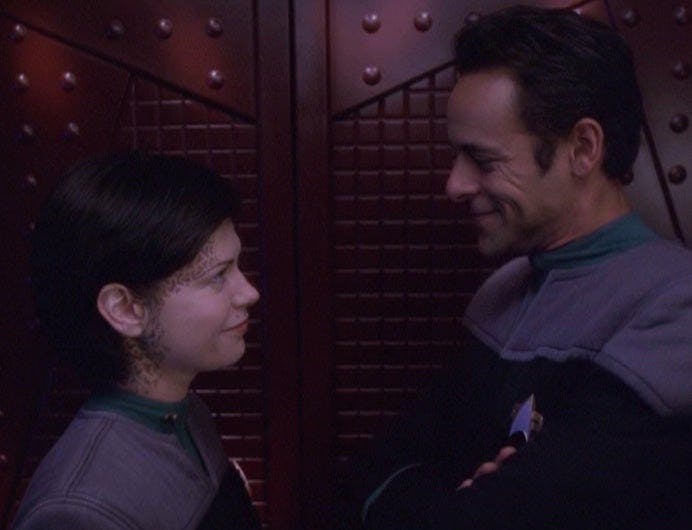
"The Dogs of War"
StarTrek.com
With Ezri Dax, everything aligns more evenly. The slapdash changing of hosts upon Jadzia's death meant that Ezri was not prepared to take on the Dax symbiont, and as a result, she has visible trouble keeping track of all of the personalities in her head and which memories belong to her or them. At times, this extends to the gender she senses herself to be — combined with her androgynous presentation, Ezri is more explicitly genderfluid than Jadzia or any other Trill on-screen. The manifestation of her gender alongside the isolation that came with being the new Dax among a crew still actively mourning Jadzia puts her on a similar state of uneven footing with Bashir. Both alone due to aspects of who they are and both, in this reading, trans, their relationship is far from a staple heterosexual romance, finding solace in their shared margins.
Very little of this can be called textual — it is not the explicit kind of representation found in or , but seeing oneself in a character even when that reading was unintended can be just as important. There is a special kind of power in seeing something that was not made for you, and still pointing at it saying, "This is mine now." It is forcibly making space where there was none, and it is not the type of space that can be taken away.
Sorting out my gender has been a years-long process, never quite landing in any one spot for too long. But by the time I finished Deep Space Nine's series finale, what had once been a foreboding question mark hanging over my head started to solidify into something legible. While I cannot say Bashir is the sole reason for that, he certainly played a role, if only by allowing me the space to start to define it myself.

